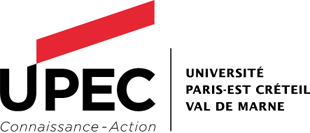- Télécharger en PDF
-
Partager cette page
- Télécharger en PDF
Vous êtes ici :
- Accueil FR ›
- L'EUR FRAPP
12 décembre - Book writing workshop -- F.G. Nicola (American University) et L. Clément-Wilz (Université Paris Est Créteil)
Publié le 5 décembre 2024
La Professeure Fernanda Nicola (American University, Washington College of Law) présente le livre qui sera publié par Cambridge University Press et qu’elle écrit durant sa visite comme Professeur invitée à l’Université Paris Est Créteil et son séjour à la Cité internationale Universitaire de Paris. Les chapitres déjà écrits sont soumis à la discussion par des experts reconnus de la Banque mondiale et du droit comparé.

Date(s)
le 12 décembre 2024
De 9h à 12h00
Lieu(x)
Maison Ile-de-France, Cité internationale Universitaire de Paris
9D Boulevard Jourdan 75014 Paris
RER B : Cité Internationale ; Tram T3a
Télécharger le plan d'accès à la MIDF
9D Boulevard Jourdan 75014 Paris
RER B : Cité Internationale ; Tram T3a
Télécharger le plan d'accès à la MIDF
Book writing workshop : Mis-uses of Comparative Law in International Development, by F. G. Nicola
Organisation : F.G.Nicola (American University, Washington College of Law) and L.Clément-Wilz (Université Paris Est Créteil)
Partenaires : EUR FRAPP (UPEC), Maison de l’Ile-de-France (CIUP)
Atelier d’écriture en présence de :
Laurence Burgorgue-Larsen (University Paris 1 Panthéon-Sorbonne)
Jorge Esquirol (Sciences Po)
Afroditi Marketou (Université Paris Est Créteil)
Professor Fernanda Nicola présente le livre Mis-uses of Comparative Law in International Development, qui sera publié par Cambridge University Press et qu'elle écrit durant sa visite à l’Université Paris Est Créteil comme Professeure invitée et son séjour à la Cité internationale Universitaire de Paris.
Les chapitres déjà écrits sont soumis à la discussion par des experts reconnus de la Banque mondiale et en matière de droit comparé.
The book Mis-uses of Comparative Law in International Development examines the process of knowledge production by international development experts who engage with comparative legal reasoning. Lawyers working within international organizations, such as the European Union (EU), the OECD (Organization for Economic Co-operation and Development), multilateral development banks such as the World Bank, and transnational NGOs, frequently produce soft governance tools presented as objective data collections.
These tools are underpinned by a blend of ideological, economic, and legal perspectives on market failure, legal reforms and their impact on capital formation. The book explores how these frameworks often lead to assumptions in knowledge production—or mis-uses—regarding the normative role of comparative law in driving economic development and rule of law reforms.
The book adopts a theoretical framework grounded in established assumptions and critiques within comparative law, positioning this discipline as a discursive practice that navigates key tensions: convergence versus resistance, orthodox versus unorthodox methods, elitism versus egalitarianism, authoritarianism versus democracy, and domination versus emancipation. In developing a “theory of mis-uses” the book aims to equip lawyers to question mainstream assumptions and orthodox approaches, encouraging them to explore more pluralistic, contextualized, distributive, layered and socially just practices in comparative law.
This methodological approach emerges from the intersection of comparative law and socio-legal studies, enriched by insights of critical legal theory, feminist and critical race theory, and political economy.
Organisation : F.G.Nicola (American University, Washington College of Law) and L.Clément-Wilz (Université Paris Est Créteil)
Partenaires : EUR FRAPP (UPEC), Maison de l’Ile-de-France (CIUP)
Atelier d’écriture en présence de :
Laurence Burgorgue-Larsen (University Paris 1 Panthéon-Sorbonne)
Jorge Esquirol (Sciences Po)
Afroditi Marketou (Université Paris Est Créteil)
Professor Fernanda Nicola présente le livre Mis-uses of Comparative Law in International Development, qui sera publié par Cambridge University Press et qu'elle écrit durant sa visite à l’Université Paris Est Créteil comme Professeure invitée et son séjour à la Cité internationale Universitaire de Paris.
Les chapitres déjà écrits sont soumis à la discussion par des experts reconnus de la Banque mondiale et en matière de droit comparé.
The book Mis-uses of Comparative Law in International Development examines the process of knowledge production by international development experts who engage with comparative legal reasoning. Lawyers working within international organizations, such as the European Union (EU), the OECD (Organization for Economic Co-operation and Development), multilateral development banks such as the World Bank, and transnational NGOs, frequently produce soft governance tools presented as objective data collections.
These tools are underpinned by a blend of ideological, economic, and legal perspectives on market failure, legal reforms and their impact on capital formation. The book explores how these frameworks often lead to assumptions in knowledge production—or mis-uses—regarding the normative role of comparative law in driving economic development and rule of law reforms.
The book adopts a theoretical framework grounded in established assumptions and critiques within comparative law, positioning this discipline as a discursive practice that navigates key tensions: convergence versus resistance, orthodox versus unorthodox methods, elitism versus egalitarianism, authoritarianism versus democracy, and domination versus emancipation. In developing a “theory of mis-uses” the book aims to equip lawyers to question mainstream assumptions and orthodox approaches, encouraging them to explore more pluralistic, contextualized, distributive, layered and socially just practices in comparative law.
This methodological approach emerges from the intersection of comparative law and socio-legal studies, enriched by insights of critical legal theory, feminist and critical race theory, and political economy.
- Télécharger en PDF
-
Partager cette page
- Télécharger en PDF



